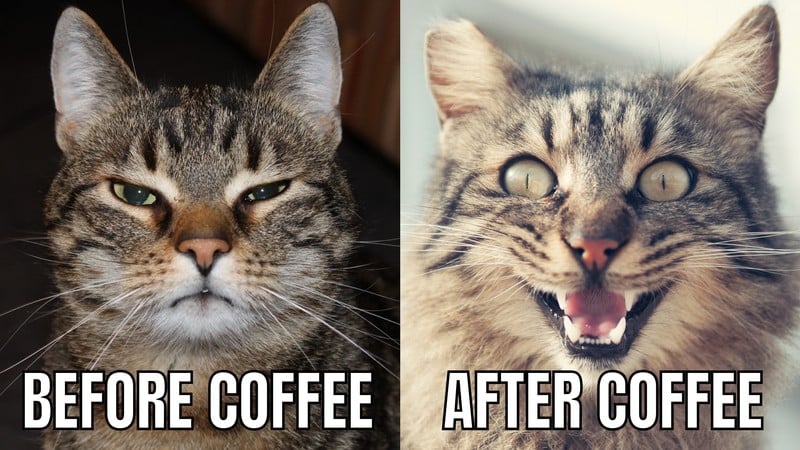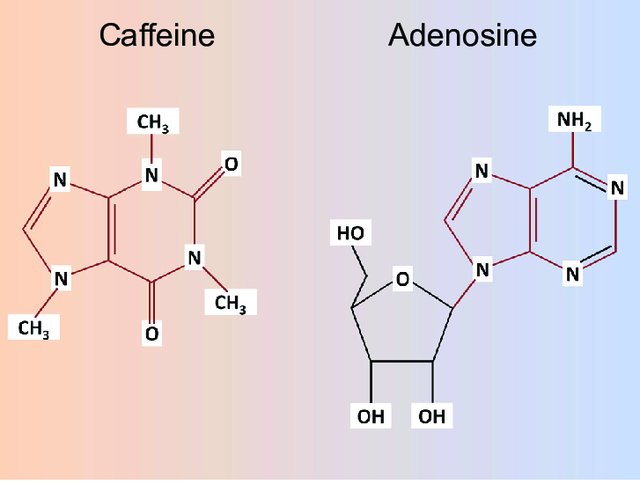Like a thermostat or air conditioner, coffee is a brain and body regulator.
Some people can’t start their day without coffee. And some get so aroused with coffee that they can’t sleep till 3 am. Almost everyone knows through experience that caffeine, the active ingredient in coffee, has an effect on mood, energy, anxiety, and focus, which then affects productivity and mental health. So instead of showing how true this is, I’ll explore the reasons why caffeine affects the brain so much.
Highlights
- Caffeine from coffee is a safe way to improve alertness and energy levels.
- Caffeine can cause anxiety beyond the healthy limit of 400mg (4 cups). Some people with anxiety or panic disorder are more sensitive and will experience worse symptoms with fewer cups of coffee. Decaf is a legit option.
- Caffeine blocks out adenosine in the brain and increases neural firing, which makes us more alert and active by preventing adenosine’s default function, which is to reduce neural firing, making us calm or drowsy.
- Caffeine can rectify or disrupt the daily depressive symptoms by changing how genes control an internal clock that affects energy, sleep, and wakefulness.
- Missing your coffee routine can drop your alertness and increase fatigue by a large magnitude, and consuming coffee can restore you to your “normal”.
How does caffeine change the brain’s performance?
A review of 41 studies[1] published in the 1990s and early 2000s held to high scientific standards (double-blind and placebo-controlled) confirms what personal experiences have always suggested. Moderate amounts of coffee improve focus, attention, vigilance, mood, physical endurance, and perceived energy levels, while excess coffee increases anxiety and sleep disturbances, and creates headaches and dehydration. The real question is now, what is moderate or excess coffee? To maximize the cognitive benefits of coffee and reduce the risks, the healthy range is 38mg to 400mg of caffeine which equates to 0.4 to 4 cups of coffee or 1 to 8 cups of tea. Anything beyond that amount increases the risk of sleep disturbances, dehydration, and anxiety.
Caffeine improves attention, but doesn’t necessarily[2] improve memory and learning. However, research suggests regular coffee does improve memory through alternate mechanisms – it enhances memory for passively learned information, probably because it increases attention and passive information is then better observed and encoded. For intentional learning, caffeine doesn’t directly improve memory, but it does improve arousal, attention, and motivation, which indirectly improves learning, just the way fun improves learning. So caffeine acts as a stimulant which improves in-the-moment cognition, especially for those who are fatigued, but not long-term memory otherwise.
While this range is generally a good bet, there are large differences in people’s neural responses and hyper-sensitive people may react to small doses of coffee very strongly and hyperstimulation-seeking people may want to overconsume coffee to feel a caffeine high.

Caffeine blocks adenosine to increase neural activity
Caffeine in coffee (and in other substances like gum, teas, medications, or energy drinks) is structurally similar to another neurochemical called Adenosine, which is produced by the brain to manage the sleep-wake cycle. Adenosine binds to adenosine receptors to lower neural activity and signals a sleepy/drowsy mood. Because caffeine looks so similar to the nervous system, it binds to adenosine receptors and blocks out adenosine[3] in a region called Nucleus Accumbens[4]. So the brain does not have enough adenosine bound to its receptors to increase sleepiness. Instead, caffeine increases the neural firing rate, which we interpret as high energy and arousal. So caffeine not only increases neural activity on its own but also cancels the reduction in activity which would’ve occurred through adenosine’s action. We experience the double-layered boost in arousal as a jolt or sudden hyperactivity.

The similarity is highlighted in red. It is enough for adenosine receptors to bind to caffeine.
Caffeine then tightens blood vessels in place of adenosine which would’ve opened them up. The pituitary gland uses this change in the brain as a signal to push adrenaline into the system, making us more alert and energized as seen during a fight or flight response. Caffeine also[6] inhibits phosphodiesterase (PDE) which promotes cardiac health and male sexual function, and reduces GABA-A’s calming effect on the nervous system. GABA-A is an important neurotransmitter that reduces neural signaling in the central nervous system, which makes us calm. So increasing GABA-A generally increases arousal and anxiety.
Caffeine gives a dopamine hit, but the underlying mechanisms are not as simple as caffeine increasing dopamine, so we feel good. Dopamine is primarily active during the anticipation and expectation of a rewarding feeling. So the energy you expect from coffee partly increases dopamine activity in the brain. But there is more. Apart from caffeine binding with adenosine receptors and reducing adenosine’s calming of the nerves, so to speak, caffeine increases dopamine activity[7] because the same receptors also connect with dopamine systems in the brain.
Related: How music, multi-tasking, and distractions improve or worsen focus
Genes controlling daily energy levels
Regular caffeine intake reduces depressive symptoms by increasing the tendency to move and act energetically. Research has found one genetic pathway[8] for why this happens. In depression, diurnal cycles are modified and become unhealthy for daily functioning. A diurnal cycle is any physical or mood change that occurs roughly every 24 hours. For example, a depressive episode every evening is a diurnal disturbance. Another common diurnal disturbance is feeling drowsy during the day and an inability to sleep at night.
We have 2 important genes called CLOCK and BMAL1[9] which rhythmically activate to regulate our sleep-wake cycle. Depression disrupts CLOCK and BMAL1’s function to manage our diurnal rhythm, so fixing that functioning reduces depressive symptoms like odd changes in energy and mood throughout the day. Caffeine does this fixing, and it is a fast-acting change that elevates mood. Researchers have observed that caffeine promotes a protein called DARPPP-32 to bind to the CLOCK gene and that disrupts the malfunctioning balance of CLOCK and BMAL1.
In simple terms, caffeine doesn’t correct the balance, it only disrupts it. If the balance is healthy, consuming too much coffee can disrupt how CLOCK and BMAL1 function. If the balance between the 2 genes’ functioning is unhealthy leading to depressive episodes during the day, caffeine creates an opening to modify that balance. For example, coffee during unnatural fatigue during afternoon depression can help the person retrain their internal clock to not feel that fatigue.
Coffee withdrawals
For regular coffee consumers, even missing coffee once in the morning is enough to increase fatigue, sleepiness, lower energy, and worsen the ability to do attentive work. A study[10] that tested the effects of coffee deprivation on regular drinkers observed that coffee withdrawals set in immediately and people start losing focus, lower their capacity to work, have slower reaction times, and make more errors in tasks that need continuous focus. They also experience more lethargy and headaches after missing their routine coffee.
Research[11]says that caffeine has an odd mix of pros and cons where it can help us reduce age-related cognitive decline, but getting used to coffee doesn’t really boost performance above normal after a while. Once a person is on coffee, they may experience withdrawal when they don’t get coffee, and that sharply reduces energy levels and the ability to focus. When they consume coffee, the withdrawals stop but don’t necessarily increase baseline energy. So they have to continue using coffee to maintain normal functioning. Coffee may even increase anxiety in susceptible people or when there is a high dose of coffee (generally considered as 400mg a day, which is 1 liter of coffee, or 4 cups of coffee).
Related: Is music good or bad while studying?
Coffee-induced arousal and anxiety
Caffeine improves arousal, but not necessarily mood directly. One study[12] observed that caffeine increased arousal, but didn’t affect the “valence” of emotions such as positive or negative feelings. However, people do feel positive or negative feelings after coffee intake, apart from just the energy level. That is, they may feel energetically anxious or energetically excited. This might be more controlled by people’s interoceptive perception[13] – their ability to recognize bodily changes and interpret them. Some may interpret caffeine-induced arousal as anxiety and some may interpret arousal as excitement because both share common bodily changes like increased heart rate, negative feelings, and blood pressure[14]. This itself puts the body in a fight-or-flight type healthy stressful state, which inherently improves focus, memory, and mental sharpness. People interpret their experiences (it’s called sense-making), and that drives the “story” they tell themselves. The sense-making tendency then becomes a person’s belief system about what coffee does to their mood.
Now, let’s look at how caffeine metabolism affects performance changes due to caffeine. Researchers studied[15] this by comparing a caffeine group and a decaf group and the effects of time of day and consumption habits on a variety of psychological aspects like attention, focus, mental health, personality, and everyday adjustment. They found time of day, coffee consumption habits, personality, and mental health did not affect their performance or coffee metabolism.
Caffeine, being generally safe, has opened the door to testing how much caffeine a person can handle before they show a negative problem – these are called caffeine challenge tests. These have given valuable insights into the “anxiogenic” effects fo caffeine which is how caffeine induces anxiety.
In one such caffeine challenge study[16], caffeine-induced panic attacks in those with panic disorder but did not in those with depression or those who were healthy. In fact, having panic disorder makes one susceptible to panic attacks, and caffeine amplified this. Depression is generally a low arousal state and caffeine is known to improve arousal, but caffeine, in their study, did not increase arousal to the point that they get panic attacks. Volunteers in the study consumed 480mg of caffeine which is at the threshold of healthy consumption.
There is a broad consensus[17] in research now around caffeine and anxiety. Beyond the healthy limit, caffeine can induce anxiety and panic attacks. This limit is about 400 mg per day (4 cups), but those with anxiety and any form of panic disorder are more sensitive to caffeine, so they experience more anxiety or panic with a lesser dose. Decaf doesn’t contain caffeine, so decaffeinated coffee doesn’t have a direct neurobiological effect on anxiety.
P.S. Because a psychostimulant like coffee can raise your energy level, you can follow the cultural norm of coffee meets/dates to enter a good mood and initiate friendships, particularly when your pre-coffee low mood or arousal was demotivating you from taking extra effort.
Sources
[2]: https://content.iospress.com/articles/journal-of-alzheimers-disease/jad091315
[3]: https://onlinelibrary.wiley.com/doi/abs/10.1111/j.1467-3010.2007.00607.x
[4]: https://www.ncbi.nlm.nih.gov/pmc/articles/PMC3153505/
[5]: https://www.researchgate.net/publication/273755124_The_seeming_paradox_of_adenosine_receptors_as_targets_for_the_treatment_of_Alzheimer%27s_disease_Agonists_or_antagonists/figures?lo=1
[6]: https://pubmed.ncbi.nlm.nih.gov/20164566/
[7]: https://www.sciencedirect.com/science/article/abs/pii/S0091305796004352
[8]: https://www.sciencedirect.com/science/article/abs/pii/S002839082030201X
[9]: https://pubmed.ncbi.nlm.nih.gov/24395244/
[10]: https://www.sciencedirect.com/science/article/abs/pii/S0031938498001632
[11]: https://onlinelibrary.wiley.com/doi/abs/10.1111/j.1467-3010.2007.00607.x
[12]: https://www.sciencedirect.com/science/article/abs/pii/S0005796798001909
[13]: https://link.springer.com/article/10.3758/s13423-019-01632-7
[14]: https://link.springer.com/article/10.1007/BF01857602
[15]: https://onlinelibrary.wiley.com/doi/abs/10.1002/hup.326
[16]: https://pubmed.ncbi.nlm.nih.gov/17445520/
[17]: https://www.researchgate.net/publication/51529108_Caffeine_challenge_test_and_panic_disorder_A_systematic_literature_review

Hey! Thank you for reading; hope you enjoyed the article. I run Cognition Today to capture some of the most fascinating mechanisms that guide our lives. My content here is referenced and featured in NY Times, Forbes, CNET, and Entrepreneur, and many other books & research papers.
I’m am a psychology SME consultant in EdTech with a focus on AI cognition and Behavioral Engineering. I’m affiliated to myelin, an EdTech company in India as well.
I’ve studied at NIMHANS Bangalore (positive psychology), Savitribai Phule Pune University (clinical psychology), Fergusson College (BA psych), and affiliated with IIM Ahmedabad (marketing psychology). I’m currently studying Korean at Seoul National University.
I’m based in Pune, India but living in Seoul, S. Korea. Love Sci-fi, horror media; Love rock, metal, synthwave, and K-pop music; can’t whistle; can play 2 guitars at a time.



























